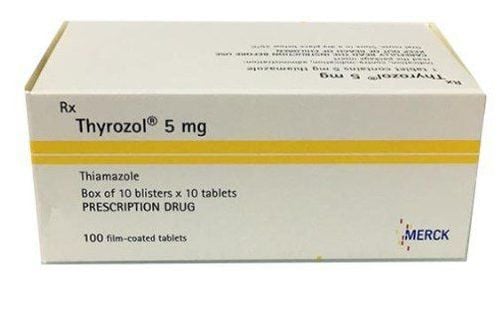This is an automatically translated article.
Carbimazol drugs are indicated in the treatment of thyroid disease, helping to control and gradually stabilize the patient's health, making many patients feel secure to work and work more efficiently. So to find out what is Carbimazol drug? What is the correct way to drink? The following article will help you better understand the uses of Carbimazol.
1. What are the uses of Carbimazol?
1.1. What is Carbimazol? Carbimazol drug belongs to the group of drugs that suppress the thyroid gland, is made in the form of tablets with many different strengths such as 5mg, 10mg, 15mg.
Carbimazol is recommended for use in adults and can be used in infants, but requires strict supervision during use.
1.2. What does Carbimazol do? Carbimazol has the effect of blocking the synthesis of thyroid hormone, reducing the amount of thyroid hormone entering the circulation, thereby, reducing the state of thyrotoxicosis. It does not inhibit the action of thyroid hormone that is already formed in the thyroid gland or is present in the circulation, does not inhibit the release of thyroid hormone, nor does it affect the effectiveness of externally administered thyroid hormone. Therefore, the drug Carbimazol is not effective in toxicity due to overdose of thyroid hormone.
Carbimazol does not cure the cause of hyperthyroidism and is not usually used long-term to treat hyperthyroidism.
Carbimazol is prescribed by doctors in the following cases:
Treatment of symptoms of hyperthyroidism (including Graves-Basedow disease). Treat before thyroid surgery for hyperthyroidism, until the basal metabolism is normal, to prevent a bout of thyrotoxicosis that may occur during hemithyroidectomy. Administer adjuvant therapy before and during radioactive iodine (131I) therapy until it is effective in removing the thyroid gland. Treat a bout of thyrotoxicosis (but propylthiouracil is more often indicated) before iodized salt. Often used concomitantly with beta-blockers, especially in the presence of cardiovascular symptoms (eg, tachycardia).
2. Usage of the drug Carbimazol
2.1. How to take Carbimazol Should read the instructions carefully before using the drug. Carbimazol drugs can be taken before or after meals. Use this drug on an empty stomach without worrying about stomach irritation. Take the medicine at the same time of day, so you will avoid missing a dose every day. The duration of treatment can last up to 6 months and can also last up to 18 months. It depends on the patient's medical condition and also as prescribed by the doctor. Absolutely you should not arbitrarily prolong the dose. 2.2. Carbimazol dosage Carbimazol cannot treat the cause of hyperthyroidism, therefore, if after 12 to 18 months of drug use (usually less than 24 months) the thyrotoxicosis persists, the thyroid must be removed or removed. use radioactive iodine.
Dosage for adults
Use starting dose divided into 2 - 3 doses per day, use 20 - 60mg. The interval between doses is 6 hours to ensure the drug is fully effective and safe for users to avoid overdose. Carbimazol usually improves symptoms after 1-3 weeks, and thyroid function should return to normal after 1-2 months. When the patient's thyroid function returns to normal, reduce the dose gradually, until the lowest dose and still maintain normal thyroid function. Usually, the maintenance dose is 5 - 15mg per day depending on the patient. When adjusting for maintenance, care should be taken: If the maintenance dose is too low, the hyperthyroidism reappears or worsens; If the maintenance dose is too high, it will reduce hypothyroidism, increase TSH, increase the volume of goiter. The duration of treatment is usually 12-18 months. Dosage for children
Children aged 0 - 1 year: 250mcg Carbimazol/kg x 3 times/day. Children from 1 to 4 years old: 2.5mg Carbimazol x 3 times/day. Children from 5 to 12 years old: 5mg Carbimazol x 3 times/day. Children from 13 to 18 years old: 10mg Carbimazol x 3 times/day. Carbimazol has been associated with bone marrow depression and treatment must be stopped immediately if there are any signs of neutropenia. Relatives of the child should be asked to report symptoms and signs of infection, particularly pharyngitis. Perform a white blood cell count every 3-6 months if there are clinical signs of infection.
After a long time of treatment, when the clinical manifestations decrease, determine the level of thyroid hormone, if the drug is stopped and the disease recurs, the drug must be re-administered, or treated with another method.
On the other hand, forgotten medications can be taken within 1 to 2 hours of the doctor's prescription. However, if it is too far from the time when you need to take the medicine, you should not make up or double the dose, which can be dangerous for the body. It is better to skip the missed dose and start taking the next dose.
In addition, using Carbimazol in high doses and for a long time will cause a lot of complications or unwanted side effects, but with more seriousness. The most serious is agranulocytosis, marrow failure; especially can lead to increased TSH, decreased thyroid function, increased volume of goiter.
If any unusual symptoms occur while taking the drug, you should contact the treating doctor if necessary, you can intervene with medical measures, treat symptoms, it may be necessary to use corticosteroids or antibiotics. delivery, blood transfusion if there is myelosuppression and severe leukopenia.
3. Contraindications of the drug Carbimazol
Hypersensitivity to carbimazol or Thioimidazole derivatives such as Thiamazol. TSH-dependent thyroid cancer. Myelosuppression, severe leukopenia. Severe liver failure. Bone marrow damage or inflammation of the pancreas (pancreatitis) in the past after taking carbimazole or Thiamazol. Bile obstruction (cholestasis) Taking thyroid hormone during pregnancy
4. Notes when using Carbimazol drugs
4.1. General Notes Must be used by a specialist and monitored throughout the course of treatment. It is necessary to monitor the white blood cell count, white blood cell count, and liver function before starting treatment and weekly for the first 6 months of treatment because there may be myelosuppression, severe leukopenia, especially in elderly patients. or take doses of 40 mg or more per day. Monitor prothrombin time before and during treatment if bleeding is seen, especially before surgery. Extreme caution must be exercised when Carbimazol is administered to patients taking drugs known to cause agranulocytosis. Taking too high a dose of antithyroid drugs can cause hypothyroidism and goiter. There is a possibility of cross-sensitization between antithyroid drugs (approximately 50%). Therefore, care should be taken when changing medications. 4.2. Caution for pregnant women The active metabolite of Carbimazol, Thiamazol, crosses the placenta, so it may cause harm to the fetus (goiter, hypothyroidism, some birth defects), but the risk is real. usually low, especially at low doses. Some of the congenital malformations that have been reported include: Posterior nasopharyngeal stenosis and congenital skin growth arrest, congenital malformations of kidney, skull, cardiovascular, tumors, gastrointestinal malformations, malformations umbilicus and duodenal prolapse. It is necessary to weigh the benefits/disadvantages between treatment and no treatment. In cases where treatment is required, Propylthiouracil is often preferred, because the drug crosses the placenta less than Thiamazol. When Carbimazol is used, the lowest effective dose should be used to maintain maternal thyroid function within the normal range of normal pregnancy, particularly during the third trimester. Hypothyroidism and fetal goiter often occur when antithyroid drugs are taken close to the due date, because the fetal thyroid gland does not produce thyroid hormone until the 11th or 12th week of pregnancy. Hyperthyroidism can decrease in the mother as the fetus develops, so in some people, the dose of Carbimazol can be reduced, sometimes stopping treatment for 2-3 months before delivery. Thyroid hormone crosses the placenta very little, so it is less able to protect the fetus. Thyroid hormones should not be used during pregnancy, as they may mask the signs of regression of hyperthyroidism and avoid unnecessary increases in the dose of Carbimazol, causing additional harm to the mother and fetus. 4.3. Note to lactating women Thiamazol is a metabolite of carbimazol that is excreted in breast milk, which can cause complications for the infant, because the concentration of thiamazol in serum and breast milk is approximately equal. If the mother needs to use the drug, she must use the lowest effective dose and not breastfeed 4 hours after taking the drug. One study in which 15 mg of carbimazol, or 10 mg of thiamazol, or 150 mg of propylthiouracil was administered daily to infants, and breastfed 4 hours after dosing, found no adverse effects in the infant. Certainly, if the mother is taking the drug, do not breast-feed. 4.4. Caution when driving and operating machinery Because the drug can cause headaches as a side effect, be careful when driving and operating machinery. 4.5. With aminophylin, oxtripylline, theophylline, cardiac glycosides, beta-blockers: In hyperthyroidism, the metabolism of these drugs is increased. Using carbimazol, if the thyroid gland returns to normal, the dose of these drugs should be reduced. With amiodarone, iodine, glycerin iodide or potassium iodide: drugs containing iodine reduce the body's response to carbimazol, so the dose of carbimazol must be increased (amiodarone has 37% iodine). With anticoagulants that are coumarin or indandion derivatives: Carbimazol can reduce the blood prothrombin index, thus increasing the effect of oral anticoagulants. Therefore, it is necessary to adjust the dose of anticoagulants based on the prothrombin time. Radioactive iodine 131I: Thyroid suppressants can reduce the absorption of 131I by the thyroid gland; but 5 days after abrupt discontinuation of antithyroid drugs, absorption of 131I may increase again.
5. Side effects of the drug Carbimazol
The overall incidence of adverse events is 2 to 14%, with severity less than 1%. Complications when taking the drug occur depending on the dose and use of the patient, these events usually occur in the first 6 to 8 weeks.
Common
Skin: allergy, skin rash, itching (1 – 4%). Gastrointestinal: Nausea, vomiting, digestive disorders. Blood: Leukopenia is usually mild to moderate. But about 10% of patients with hyperthyroidism do not treat, white blood cells often fall below 4000/mm3. Body as a Whole: Headache, moderate and transient fever. Uncommon:
Blood: Bone marrow depression, agranulocytosis (0.03%, with re-dose 0.7%) manifested as severe fever, chills, throat infection, cough, sore mouth, hoarse voice. Occurs more often if you are elderly or taking high doses. Decreased blood prothrombin, causing hemolytic anemia. Musculoskeletal: Joint pain, arthritis, myalgia. Skin: Alopecia, lupus erythematosus syndrome. Rare:
Carbimazole can cause a rare but serious side effect that lowers the number of blood cells that help fight infection and stop bleeding. If you have any of the following symptoms, tell your doctor right away:
Liver: Cholestatic jaundice, hepatitis . Kidney: Headache, mild fever, loss of taste, tinnitus, hearing loss. Metabolism: High doses and prolonged use can cause hypothyroidism, increase the volume of goiter. Instructions on how to handle ADR:
When experiencing sore throat, infection, skin rash, fever, chills, the patient must go to a doctor for hematology check. If agranulocytosis is found, marrow failure, treatment must be stopped, care, symptomatic treatment and blood transfusion may be required. Cholestatic jaundice, hepatitis are rare; but if it occurs, the drug must be stopped immediately, because death has been observed. Severe muscle pain, creatine phosphokinase should be tested; If the increase is much, the dose must be reduced or the drug discontinued. In case of ototoxicity, carbimazol should be discontinued and replaced with Benzylthiouracil or Propylthiouracil. An itchy rash, allergic reactions, can be resolved by taking antihistamines without stopping the drug. Carbimazol can be replaced with antithyroid drugs thiouracil.
6. How to store Carbimazol?
Store in a cool, dry place, at a temperature not exceeding 30°C, in the original packaging and protected from light. Do not leave in bathroom or refrigerator. Keep out of reach of CHILDREN.
Please dial HOTLINE for more information or register for an appointment HERE. Download MyVinmec app to make appointments faster and to manage your bookings easily.













